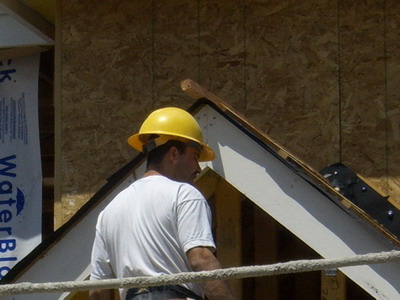 |

A standing seam roof is constructed from many interlocking panels that run vertically from the ridge to the eave of the roof. The interlocking seams where the two panels join together are raised above the roof’s flat surface for easy water run-off. Standing seam roofing is suitable for either spanning across purlins on typical spacing, or laid directly over rigid insulation and/or solid decking. Many combinations of panel widths, seam profiles, and rib heights provide extensive design flexibility, and standing seam roofing comes in a variety of styles and sizes to achieve an array of visual effects.
 |  |  |
A standing seam metal roof boasts many qualities that account for its popularity among Americans. Firstly, a standing seam roof requires next to no maintenance, and will not crack, shrink, erode, or perforate. Secondly, standing seam roofing provides extreme weather protection, including durability against hail and rain, and resistance to high winds - it is the most stable form of roofing during hurricanes. Standing seam roofing is about 50-100% recyclable, and are fire resistant, meaning they won’t burn or support combustion, yet are still able to reflect the sun and reduce cooling costs. Their lightweight material does not require additional framing, which means extra roof space for you. And finally, a standing seam metal roof is fairly quiet - the same noise level as asphalt, clay, or wood.
Our skilled professionals are able to install standing seam roofing extremely quickly due to many simple snap-lock standing seam roofing kits. The quick installation and easy accessibility to metal roofing means it will be relatively cheap, and can even be installed over existing asbestos or asphalt roofs.
Metal roofs are simple to maintain, and knowing the basics of how to metal roof can ensure your metal roof lasts its full lifetime. Proper maintenance of metal roofing will keep it in great shape for up to 30 years.

|